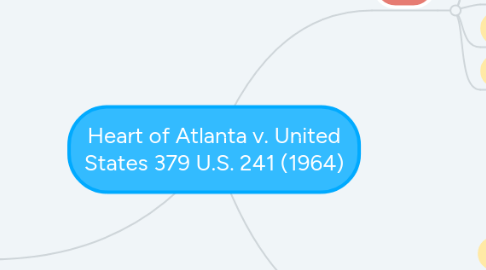
1. Mod 2
2. IRAC
2.1. Facts
2.1.1. Parties
2.1.1.1. Heart of Atlanta
2.1.1.2. United States
2.1.2. What Happened
2.1.2.1. Heart of Atlanta motel refused to rent rooms to African Americans
2.1.2.2. the motel brought an action to declare the Civil Rights Act unconstitutional
2.1.3. Procedural History
2.1.3.1. District Court prohibited the motel from discriminating on the basis of race
2.1.3.2. Heart of Atlanta Appealed and the case went to the Supreme Court
2.2. Issue before the Court
2.2.1. Whether Congress can prohibit racial discrimination through the Civil Rights Act
2.3. Rule of Law
2.3.1. Supreme Court ruled in 1954 that racial segregation in public facilities violated the constitution
2.3.1.1. "Public facilities" included schools, restaurants, and motels.
2.3.2. Civil Rights Act passed in 1964 prohibiting racial discrimination in "establishments affecting interstate commerce".
2.4. Application
2.4.1. Plaintiff
2.4.1.1. the motel argued that the business was not in interstate commerce but "of a purely local character".
2.4.2. Defendant
2.4.2.1. The motel was located off a major highway
2.4.2.2. 75% of the motel guests were out of state residents
2.4.2.3. the motel advertised via billboards throughout the state
2.4.3. Court
2.4.3.1. Justice Clarke stated that the discrimination of African Americans would indeed affect interstate commerce.
2.4.3.1.1. lack of lodging would prohibit African Americans from traveling as freely or as often
2.4.3.1.2. The population on a whole had started to become more mobile
2.5. Conclusion
2.5.1. Supreme Court reinforced the Civil Rights Act and showed that Congress could reach to local practices to stop discrimination on the basis of its affecting interstate commerce
3. 3 i's
3.1. Impact
3.1.1. case played a large part in stopping the Jim Crow laws
3.1.2. more recently it's cited as allowing the Violence Against Women Act to be overturned in US. V Morrison (2000)
3.2. Importance
3.2.1. Business Owners
3.2.1.1. Familiarize yourself with the law so you can make better business decisions
3.2.1.2. Be aware of prejudice in yourself and your company culture and understand the value and necessity of differences
3.3. Influence
3.3.1. obvious answers
3.3.1.1. HR practices
3.3.1.2. business legal council
3.3.2. Realistically, the upholding of the civil rights act has influenced virtually every business practice.
